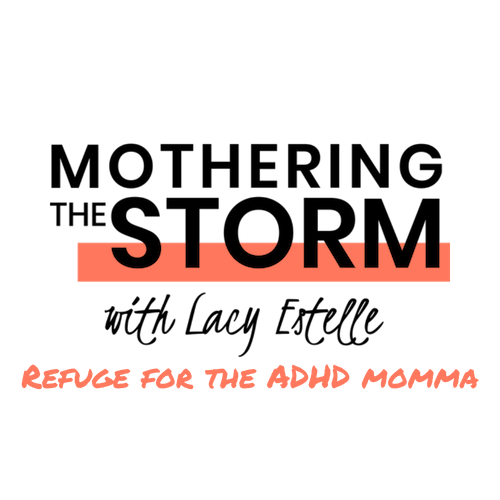This post may contain affiliate links. This means, if you make a purchase from a link on this page, I may receive a small commission at no extra cost to you. You can find our entire disclaimer here.
Tell someone else!
Being a parent of any child comes with lots of challenges and adventures. Being a parent of an ADHD child can be extra challenging. And I know that from first hand experience. I want to share with you some of the strategies that I’ve learned about how to handle ADHD tantrums.
One of the main reasons that I started this blog was to share my experiences and the knowledge I’ve collected over the years. My hope is to make other people’s journeys with ADHD a little smoother. As an ADHD parent of an ADHD child, how to handle tantrums has been something of a constant in my life for a while now. I’ve read all the things and tried all the things and I want to share some of what has worked in our home.
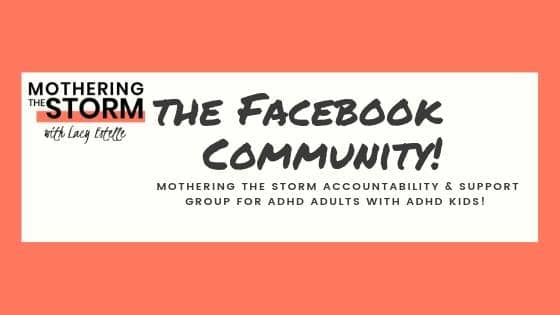
Click Here to Join the Mothering the Storm Facebook Group! An Encouragement Group For Parents who have ADHD and are also caring for an ADHD Child!
Remember though, every parent, child, and family dynamic is different. What works in my home may look a little different at yours. Or it may not work at all. And that’s ok! Always keep this in mind: the most important thing we can do for our kids is to love them. And we are already rock stars at doing that!
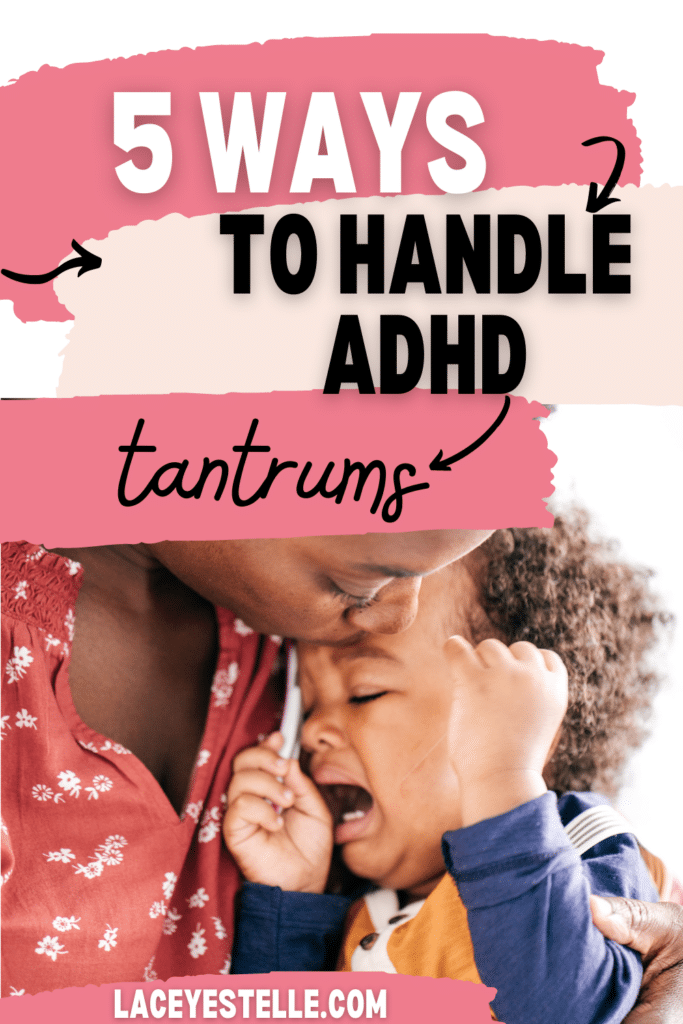
How to Handle ADHD Tantrums
Ok, the first thing that I want you to do is take a deep breath. Chances are that, if you’re like me, there has been a tantrum in your recent past and just reading about them can make you tense up. So, take a nice deep cleansing breath and enjoy the moment of calm.
No Blame and No Shame
The next thing that I want you to do is give yourself lots of grace. Not just right now, but always! The tantrum behaviors that our children exhibit can be frustrating at the best of times. But we are not to blame. I know that I’ve often asked myself what I’m doing wrong as a parent whenever a tantrum is in full swing. Especially when we are in public.
The answer, however, is that I’m not doing anything “wrong”. Obviously we all make mistakes as parents but our children’s tantrums are usually not a result of them. Whether a child is ADHD or neurotypical, tantrums are par for the course. They are a normal way for children to express themselves when their vocabulary or strength of emotion won’t allow them to do so verbally.
There are things that we can do to try and lessen the frequency of tantrums but they are going to happen. We need to stop blaming and shaming ourselves and remember that we are showing up everyday and doing the best that we can to help our children!
What is Different about ADHD Tantrums?
The difference between the tantrums of neurotypical kids and ADHD kids is that the frequency, length, and duration of the tantrums can be so much more. A neurotypical child will usually leave tantrums behind them towards the end of their toddler years. Occasionally one will pop up after that but they become very infrequent. With ADHD children, tantrums can last much later into their childhood.
Tantrums in ADHD children can occur much more frequently than with neurotypical children and can last longer. All children (and most adults too!) struggle to handle their strong emotions. Finding an appropriate outlet for those emotions is something that we spend our whole lives trying to learn and perfect. For ADHD kids, learning how to process and handle emotions is much harder.
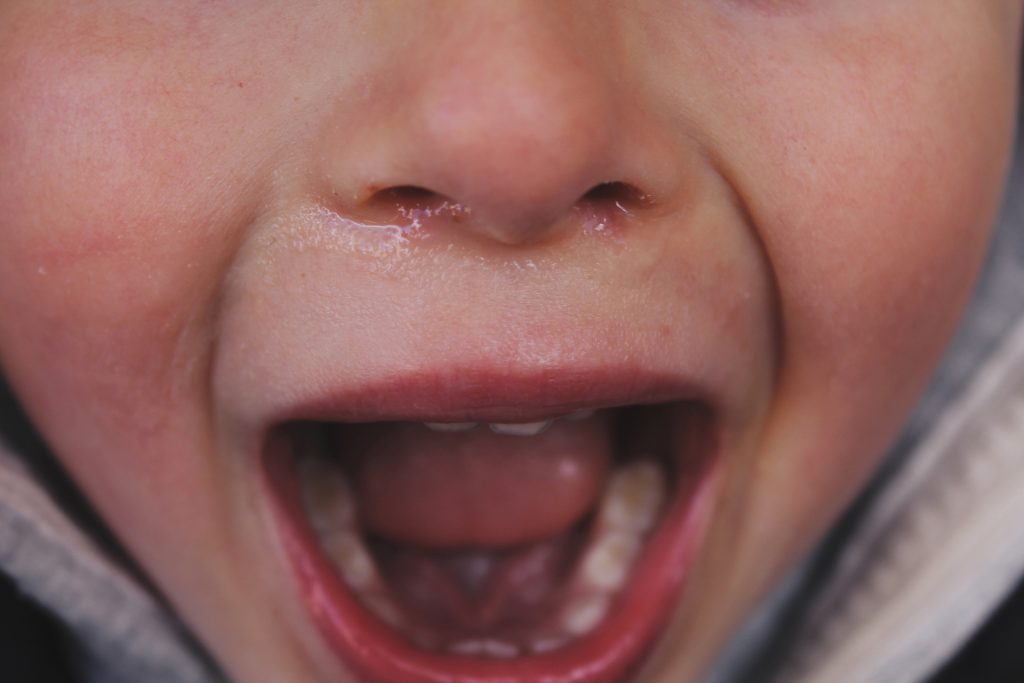
So it makes sense that it takes longer for them to learn the coping and communication skills that will allow them to leave those tantrums behind. It also makes sense that our children will have tantrums more often. One of the main causes of temper tantrums for all children is overstimulation. We know that our ADHD kiddos tend to experience overstimulation more frequently and to a greater degree than their neurotypical peers.
With all that being said, here are 5 ways to handle ADHD tantrums…
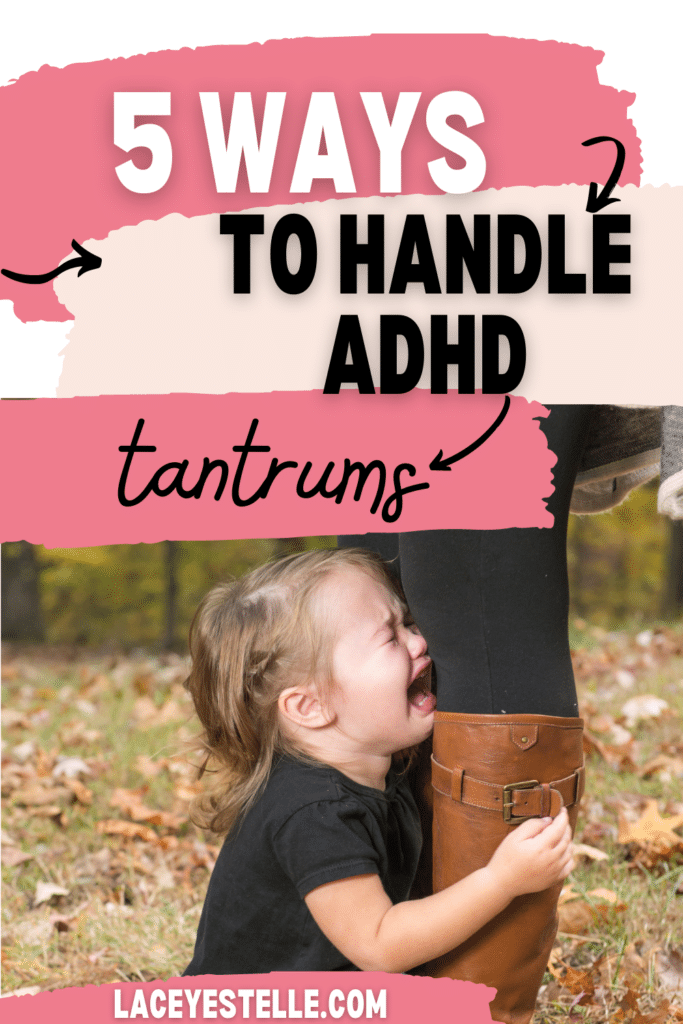
1. Preventing (some of) the ADHD tantrums in the first place
There is no way to prevent all tantrums but there are things that we can do to prevent some. You are probably already tuned in to what can trigger overstimulation in your child. There’s no way to know all the reasons for overstimulation. And there is no way to entirely prevent it. However, being able to avoid or reduce the activities that tend to overstimulate your kiddo can certainly help.
You can also help to make sure that your child’s attention and autonomy buckets are full. If we can give our kids even 10-15 minutes of uninterrupted one on one time each day, they will have fewer tantrums that stem from craving attention.
A lot of tantrums come in when a child needs to feel like they are in control of some parts of their lives. We tell them what to do as well as when and how to do it, all day long. Once a babe reaches a certain age they need to feel like they have some control over their lives.
I’m not saying that they should get to dictate the family schedule or things like that. But, they can decide which color cup to use. If they want to put their shirt or their pants on first, etc. There are many opportunities throughout the day when our children can have a say in what is happening. By giving them control over these things, they will be more likely to go along with what we need them to do at other times.
2. Be consistent with schedules an boundaries
This definitely falls under the category of easier said than done, I know. For some families, their obligations and activities make consistent schedules hard to keep. And being consistent with boundaries can be a daily struggle.
Consistent schedules and routines are something that all kids thrive on. Our littles crave predictability, it makes the feel safe and secure. It also lets them know ahead of time what is coming next. That predictability can go a long way in reducing uneasiness and overstimulation.
If your family is one where schedules change often (and I totally get that!) letting your child know what to expect for the day can help. Laying out the day’s schedule for them can make them feel more included in the process. It can also lessen that feeling of overwhelm.
It can also be very helpful to have set rituals whether their schedule changes or not. Again, rituals and routines make it so the child knows what to expect and they feel comfortable in the predictability. One important ritual in our house is the bed time routine. We do the same thing in the same order every single night.
Breakfast can be a good place for routine and ritual as well. Even if it’s just the same person grabbing breakfast bars for everyone as you run out the door. It helps to set the tone for the day and gives the calm of predictability to a time of day that can be hectic on the best days. If you want to learn more about routines check out my post How to Establish Successful Routines for your ADHD child.
Boundary setting is always an ongoing process, especially until our children are at a developmental stage where they can begin practicing impulse control. The important thing is to continue to be consistent with setting and maintaining boundaries. Even when it seems like it will never click, keep at it!
Obviously if a boundary has to do with safety, we have to handle it differently. But, for the most part, calm consistency will eventually win the day.

3. Try to stay calm
I am cringing while writing those words. I know that it seems like the least helpful advice I can give. And I know how very hard it can be in the heat of the moment. But, there are a couple of reasons why it is important for us to continue striving to remain calm.
When our anxiety level goes up, our children can sense it. Think of how you feel when someone around you is angry or frustrated. We can feel that and it immediately causes our own bodies to respond with anxiety. That’s one reason it can be hard for us to remain calm during a tantrum. And our ADHD children tend to be even more sensitive to the emotions of others.
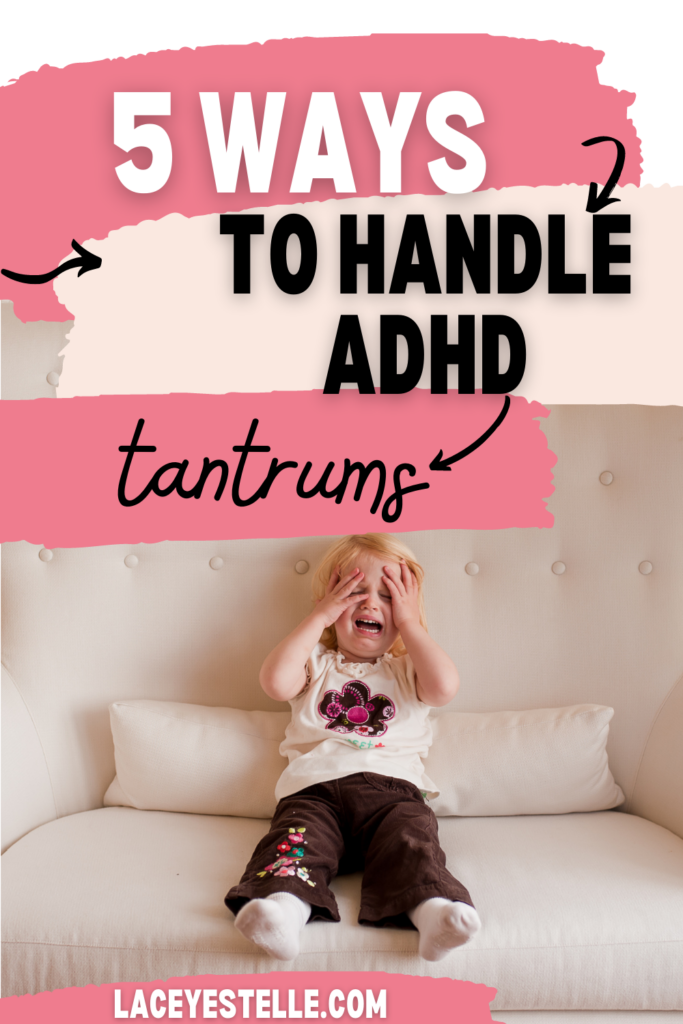
4. Let the tantrum ride
Our first instinct as parents is to try to help our children. To remove any discomfort for them that we can. If you are like me, you’ve tried everything under the sun to help your child through a tantrum. It feels like, if we can just get the tantrum to stop, surly our child will be more comfortable.
The thing to remember is that tantrums are an expression of emotions by a being who is so overwhelmed that they can’t access the upper portions of their brain. Those parts of the brain that give access to langue, reason, and impulse control are simply not accessible to a child in the midst of a tantrum.
We want to help our children to cope but reasoning, explaining, and coaching just aren’t effective in the heat of the moment. While it may be counter intuitive, the best thing to do is let your child release those powerful emotions knowing that they are with you, their safe place and refuge. Allowing them to feel and process the emotions will allow them to move past the tantrum more quickly.
If your child gets physical during their tantrums, give them a literal safe place to pound the floor and thrash around. Are you a target of the physical tantrum? Tell your child that you can’t allow them to hurt you so you are going to step away for now but you’ll be close by if they need you.
Once the tantrum has passed, you will have better success in teaching about processing and regulating emotions. No emotions last forever (thank God!). It’s important for us to remember this and also for us to teach it to our children.
5. Take care of yourself
Being a parent is an all in, all encompassing, and all exhausting adventure. It is a beautiful and glorious adventure but it is also hard work. Parents of special needs children are absolute super heroes but often reach a level of self-depletion even more quickly than other parents.
I know we’ve all heard a lot about self care lately. It’s become sort of a buzz word. But there’s good reason why so many professionals have been focusing on it’s importance. In order to be complete human beings who are able to show up for others, we have to take care of ourselves too.
We can’t be our best parenting selves if we are always running on empty. Whether it’s leaving that load of laundry so you can watch T.V. or going for a quiet walk by yourself, find something that can recharge you in your own home.
By all means, go out and treat yourself too! But it is really helpful to have something that can recharge you and is also easily accessible. That way, when you can feel the strain getting to be too much, you can take those minutes to yourself as soon as possible.
How to handle ADHD tantrums, 5 strategies
I hope that you found something helpful here and feel better able to handle the ADHD tantrums in your home. Remember that, as long as we are loving our kids, it will all come out right in the end. We are going to make some mistakes, some days are going to be better than others. But everyday that we love our children we are doing this parenting thing right!
Hang in there parents! I’m right here with you. I’d love to hear about what works for your family when it comes to tantrums. Let me know in the comment section below!

